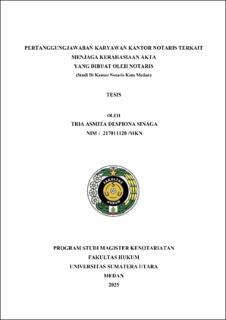| dc.contributor.advisor | Purba, Hasim | |
| dc.contributor.advisor | Siahaan, Rudy Haposan | |
| dc.contributor.author | Sinaga, Tria Asmita Despiona | |
| dc.date.accessioned | 2025-05-19T07:42:42Z | |
| dc.date.available | 2025-05-19T07:42:42Z | |
| dc.date.issued | 2025 | |
| dc.identifier.uri | https://repositori.usu.ac.id/handle/123456789/103886 | |
| dc.description.abstract | In carrying out their duties, notaries require assistance from others and may employ staff with specific qualifications to support their work. A notary's employee is any individual working under a notary with an employment relationship and receiving compensation for their services. However, not all employees in a notary office fulfill their responsibilities appropriately, and some engage in unlawful acts that may harm the notary. This thesis formulates three main research questions: (1) What are the legal obligations of notary office employees concerning the confidentiality of notarial deeds based on applicable regulations? (2) What are the legal responsibilities of notary office employees in maintaining the confidentiality of notarial deeds executed before a notary? (3) What is the notary's liability concerning the employees' duty to maintain the confidentiality of deeds made before them in the exercise of their office.
This study employs a normative juridical research method supplemented by an empirical juridical approach with a descriptive-analytical nature. The research aims to describe a situation or phenomenon and determine whether there is a relationship between various factors. Data collection techniques include literature review, and the collected data are analyzed qualitatively.
The findings indicate that notary office employees' legal obligations regarding the confidentiality of notarial deeds are not explicitly regulated under the Notary Law (UUJN). However, from an ethical and moral standpoint, notary employees are also required to maintain the confidentiality of such deeds. Employees who fail to uphold this confidentiality may be held legally accountable and classified as committing unlawful acts. Furthermore, the notary's liability regarding employees' misconduct in maintaining deed confidentiality extends to civil liability, as notaries may be held accountable for their employees' misuse of deed secrecy, even if the notary themselves was not directly at fault. | en_US |
| dc.language.iso | id | en_US |
| dc.publisher | Universitas Sumatera Utara | en_US |
| dc.subject | Liability | en_US |
| dc.subject | Employee | en_US |
| dc.subject | Notarial Deed | en_US |
| dc.title | Pertanggungjawaban Karyawan Kantor Notaris Terkait Menjaga Kerahasiaan Akta yang Dibuat oleh Notaris (Studi di Kantor Notaris Kota Medan) | en_US |
| dc.title.alternative | Employee Liability in Notary Offices Regarding the Confidentiality of Deeds Made Before a Notary (A Study at Notary Offices in Medan) | en_US |
| dc.type | Thesis | en_US |
| dc.identifier.nim | NIM217011120 | |
| dc.identifier.nidn | NIDN0003036602 | |
| dc.identifier.nidn | NIDN0104026702 | |
| dc.identifier.kodeprodi | KODEPRODI74102#Kenotariatan | |
| dc.description.pages | 166 Pages | en_US |
| dc.description.type | Tesis Magister | en_US |
| dc.subject.sdgs | SDGs 10. Reduce Inequalities | en_US |


